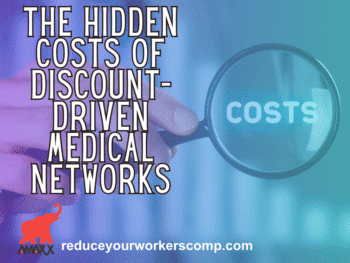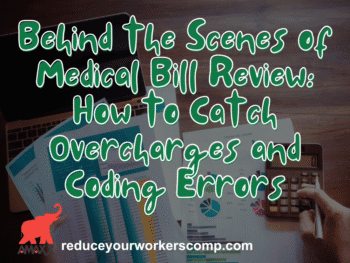Whether you run a business with just a handful of employees or one that employs dozens and dozens to hundreds and hundreds, keeping your overall costs down is critical if you are to be successful.
As too many business owners have discovered over time, out of control costs lead to a variety of problems, problems that can ultimately put you out of business.
One area that you certainly can’t afford to neglect is what you are handing out in workers compensation expenses. From the smallest of injuries when a claim is turned in to sizable ones, keeping your claim costs down should never be overlooked.
Overview of Medical Containment Strategies
In order to be most effective in not letting the medical expense of workers comp get out of hand, employers and insurers are advised to not limit their medical cost containment efforts to only a single or handful of areas. While state statutes might put a limit or bar the use of some of the methods of controlling expense, the employer or the insurer is best served when they utilize as many medical cost containment strategies as possible.
All of the following medical cost containment strategies have demonstrated their ability over time to save expenses for the business owner or the insurer:
- Top medical provider network – This is a group of doctors, hospitals and other medical providers with whom an insurance provider or a self-insured employer has put in place for medical treatment for employees injured on the job – it offers better outcomes than other providers – including decreased rates on litigation and a quicker return to the workplace;
- Nurse triage – This is the first phone call placed (following the one to the supervisor). A worker contacts an RN to go over the severity of injury and what form of treatment is best suited. In the event every workplace injury was called in to the nurse triage unit, the amount of lost time claims can decrease by some 40 percent;
- Nurse Case Management – This involves the practice of being to deal with an experienced nurse in order to properly oversee the worker’s medical treatment. The goal here is to make sure all treatment is appropriate and provided in a timely manner, allowing for a faster return to work;
- Utilization review – This is where there is a review prior to medical care being provided. There will also be concurrent reviews while the worker is hospitalized or during on-going medical care, along with retrospective reviews to verify the needs for the medical services already undertaken;
- Medical bill reviews – These are typically handled by businesses specializing in overseeing the medical bill to make sure of the accuracy of the medical bill diagnostic codes and medical bill charges. The medical bill charges will either be compared to the state fee bill schedule or with what are reasonable and customary charges for the medical services that have been provided. Medical bill reviews will include both the audits of doctor bill and hospital bill auditing;
- Pharmacy benefit managers – These are the businesses specializing in managing and maintaining cost control for medications prescribed for the employee. This will include both receiving discounts on medications plus providing drug utilization reviews to prohibit the over use of narcotics and other medications;
- Independent medical exams – These take place when the employee is sent to another medical provider for another opinion. In many cases, independent medical examinations are undertaken when the employee’s medical recovery progress is slower than normal;
- Peer reviews – This involves transmitting the medical data and diagnostic reports to another medical provider for a review of the medical information. This allows for confirmation of the appropriateness and quality for the medical care being provided;
- Analytics – The era of computers has made available the use of technology to receive information that would not otherwise be available. This includes predictive modeling to see which claims will likely be more costly, data mining for identifying high-cost medical providers, and benchmarking to allow you to compare your expense control results to those of other employers or insurance companies.
- Field Case Management: A field base nurse case manager is a case management nurse working in the field rather than in an office. The nurse meets with employees in their home, helps to devise treatment plans, early return to work, and case closure.
- Medical Advisors & Medical Directors: A medical advisor’s duties include reviewing claim files, clarifying medical information with treating physicians, attending file reviews, and discussing claims with adjusters. They comment on the nature, mechanism, length, and magnitude of the injury.
- Chiropractic Care: A chiropractic phyisician is a spinal health care expert that triages and treat injured workers with neuromusculoskeletal injuries. They can improve workers compensation injury outcomes, reduce the burden of chronic illness and reduce overall health care costs.
- Mental Health Registered Nurses: Mental health reviews attempt to improve overall wellness of injured employees where there is a psychological component causing delayed claim resolution. Nurses look for ways to improve psychological and social functioning of the employee can return to work.
- Chronic Pain Programs: Medical professionals review files meeting criteria to determine what can be done to move forward claims with chronic pain.
- Durable Medical Equipment: Durable medical equipment is reusable equipment for use in the injured employee’s home. Having the DME is part of an overall home healthcare plan.
- At-Home Recovery Services: At-home recovery costs are a fraction of recovery in a acute care hospital or nursing home. Home healthcare is a crucial tool in managing severe injury claims.
Author Michael B. Stack, CPA, Principal, Amaxx Risk Solutions, Inc. is an expert in employer communication systems and part of the Amaxx team helping companies reduce their workers compensation costs by 20% to 50%. He is a writer, speaker, and website publisher. www.reduceyourworkerscomp.com. Contact: mstack@reduceyourworkerscomp.com.
©2014 Amaxx Risk Solutions, Inc. All rights reserved under International Copyright Law.
Do not use this information without independent verification. All state laws vary. You should consult with your insurance broker, attorney, or qualified professional.


























